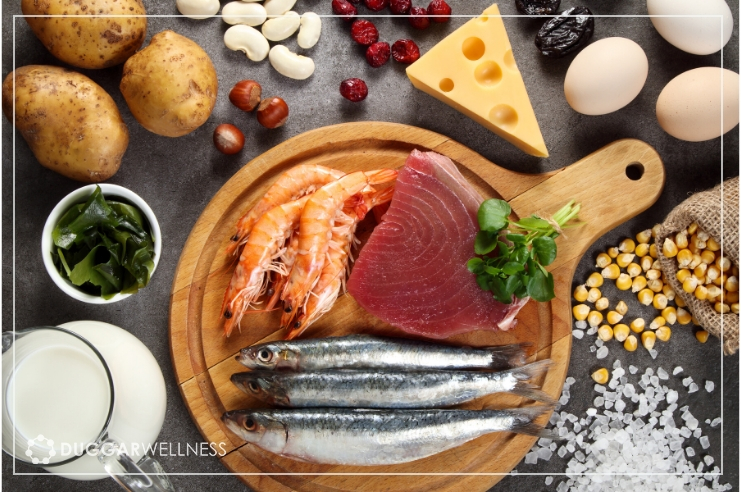In a blog post titled Functional Medicine Approach to Thyroid Health, I took a deep dive into thyroid function and which tests to run to properly evaluate yours that I wanted to follow up with the key nutrients and food sources that we need to make these critical hormones.
TSH Hormone
Remember that TSH is released by the brain and it signals the thyroid gland work and produces more thyroid hormones. Here are the four key nutrients for TSH.
- Protein – Some proteins are found in veggies but other great sources are wild-caught fish, grass-fed beef, free-range chicken/poultry, and blue-green algae.
- Vitamin B 12 – The only food source of this critical nutrient is grass-fed red meat and the organ meats are the very richest sources.
- Magnesium – Dark leafy veggies like spinach and kale as well as nuts and seeds are great sources of magnesium.
- Zinc – Grass-fed beef is the highest source. Nuts and seeds are good plant options as are shellfish, mussels, and oysters.
T4 Hormone
Remember this is the most abundant form of thyroid hormone produced but it is largely inactive until converted in the liver.
- Iodine – The number “4” in T4 refers to the number of iodine molecules that are bound to the protein structure of the chemical so it is obvious that if we are iodine deficient, we will have a hard time making optimal levels. Great sources include kelp, dulse, nori, kombu, and other sea vegetables. Iodized salt is also a source of iodine.
- Vitamin B 2 – Grass-fed beef liver and lamb are good animal sources and mushrooms and greens are good plant sources.
- Vitamin C – Like Vitamin B2 above, vitamin C is a critical co-factor in the uptake of iodine into the body. Best sources include oranges and red peppers.
T3 Hormone
This is the “activated” form of thyroid hormone responsible for most of the body effects that we associate with thyroid function.
- Selenium – The mineral selenium is required for the proper conversion of T4 to T3 instead of Reverse T3. Great sources of selenium include small amounts of soaked Brazil nuts.
Thyroid Receptors
Every cell in the body has receptors for thyroid hormones but it is quite possible for those receptors to not be optimally healthy. Two vitamins, A and D are needed for normal receptor health.
Vitamin A is only found in its preformed state in animal products. Once again, grass-fed beef and tuna fish are excellent sources. Beta carotene is a precursor form and it can be found in carrots and sweet potatoes.
Vitamin D is converted in our skin from UV rays from the sun but there are a few good food sources like salmon, beef liver and egg yolks. Best to get this from sunshine if at all possible.
 160 N Main, Bountiful, UT 84010
160 N Main, Bountiful, UT 84010  801-677-7878
801-677-7878

One response to “Super Foods for Thyroid Health”
[…] directed at restoring the gut flora, supporting the liver, lowering stress hormones and improving key nutrients like vitamin D, B12, folate, magnesium, selenium, and […]